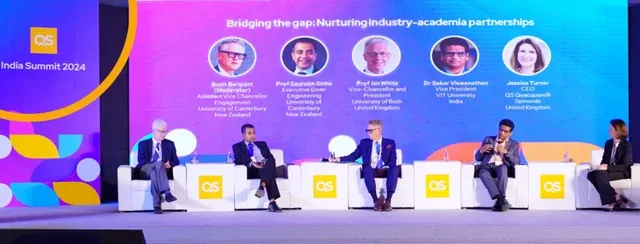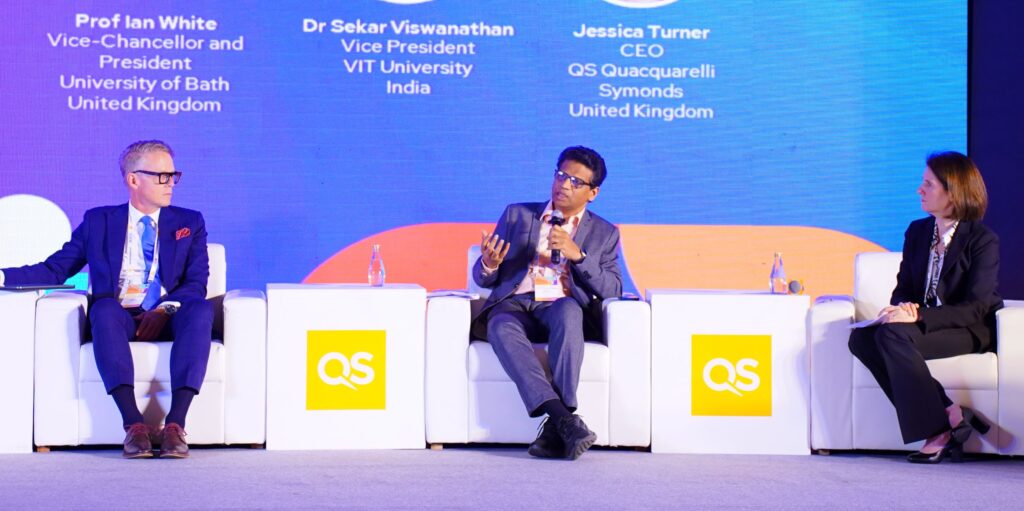
Experts at the QS India Summit 2024 convened to explore the power of partnerships in Indian higher education. One of the panel discussions held at the event, ‘Bridging the Gap: Nurturing Industry-Academia Partnerships‘, explored how education can collaborate with industry for regional economic growth and student development.
In the QS Global Employer Survey 2023, Indian companies identified significant skills gaps in problem-solving, communication, teamwork and active learning among graduates.
QS data, detailed by CEO Jessica Turner, highlighted the current skills gap: “Comparing the data in India versus other places in the world, the gap between employers’ expectations and students’ performance was a bit smaller than some other places in the world – and smaller than some countries in Asia. That is great news.”
However, there are areas where skills gaps are bigger in India than other places in the world: Ethics and social responsibility and having a sustainability mindset.
“In the world of AI, we really need to think about how we ensure that sense of ethics and responsibility is prevalent and well-understood across all undergraduate and postgraduate experiences,” Jessica said.

Example of productive partnerships
Kicking off the panel discussion, Professor Saurabh Sinha, Executive Dean of the University of Canterbury’s Faculty of Engineering said, “I’m particularly proud of the setup between science councils and our university because it had a transdisciplinary format. Members from science councils presented problems that they’re looking at and we developed a strategy across disciplines on how that could be resolved. This led to multidisciplinary projects and a programme over a multi-year period.”
He also highlighted the importance of students engaging with industry to enhance their credibility and prospects for placements and internships.
“I find a lot that when the internship grade is being awarded by the industry mentor, relationships start to develop – these are some best practices to which we can help all institutions, including smaller universities in India to acquire and grow.”
Embedding employability through placements
Professor Ian White, Vice-Chancellor and President at the University of Bath spoke on how the industry consultations are informing the degree structure at the University: “Our departments and faculties have very close connections with industry. One of the benefits of our placement scheme is, at any given time, we have about 1,500 companies talking to us directly – giving us great insight as to where they are, what that means and how students can benefit.”
Aligning skills gap data with conversations in Indian institutions
Dr Sekar Viswanathan, Vice-President at Vellore Institute of Technology (VIT), suggested that there’s often a disconnect between industry and academia in India, with both operating independently, akin to sitting on “separate ivory towers”.
“I’m not blaming either academia or industry, but they’re living in their own worlds and the connections are poor. I think the best proactive step is to reach out to the industry – I usually find that the industry are so busy with day-to-day operations, looking at the bottom-line numbers. I think academia should take the first step.”
In regard to addressing the skills gap in ethics and responsibility Dr Viswanathan said, “At our university, we do offer a course on ethics and values, but I feel that these skills cannot just be learned in the classroom. But as an institution, we owe it to our students to at least talk about it. Many conversations can happen on campus through student clubs and other activities.
“At VIT, we make sure every student is well-trained in how to speak and listen because many students we’ve seen have got great hard engineering skills – but when it comes to explaining themselves, they aren’t doing very well.
“In order to bridge this gap, institutions need to ensure that what we’re teaching aligns very well with industry demands. For example, in each course at our university, there is at least one topic which is taught by a practising professional.”
Weaving threads of collaboration into the curriculum
How can Indian universities ensure that they’re benefitting from a partnership by pulling it into the student experience and the curriculum?
Professor Sinha answered, “I think that the combination of work-integrated learning in the curriculum should be a requirement prior to graduation. As we work with the Centre for Entrepreneurship, the University has brought about opportunity for student entrepreneurship experience and employment experience.”
Planting seeds of educational prosperity
Amidst the transformative vision of Viksit Bharat@2047 and the ambitious goals set by the Indian government, how can universities facilitate Indian partnerships across all corners of the nation, including in smaller universities?
“We need more institutions to focus on creating offices for sponsored research and industry consultancy efforts,” Dr Viswanathan said. “Their role will be to explain to industries the potential their faculty and students have to the industry, like a sales pitch. Most industries are heavily self-focused and don’t even know the capabilities of many of the educational institutions surrounding them.”